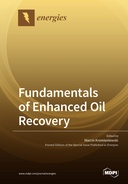Explore

Fundamentals of Enhanced Oil Recovery
0 Ungluers have
Faved this Work
Login to Fave
For many years, the trend of increasing energy demand has been visible. Despite the search for alternative energy sources, it is estimated that oil and natural gas will be the main source of energy in transport for the next several dozen years. However, the reserves of renewable raw materials are limited in volume. Along with the degree of depletion, oil recovery becomes more and more difficult, even though the deposits are not yet completely empty. Therefore, it is essential to find new methods to increase oil and gas recovery. Actions aimed at intensifying oil recovery are very rational use of energy that has not yet been fully used. Usually, an increase in oil recovery can be achieved by using extraction intensification methods. However, measures to increase oil recovery can be implemented and carried out at any stage of the borehole implementation. Starting from the well design stage, through drilling and ending with the exploitation of oil and gas. Therefore, in order to further disseminate technologies and methods related to increasing oil recovery, a special edition has been developed, entitled "Fundamentals of Enhanced Oil Recovery". This Special Issue mainly covers original research and studies on the above-mentioned topics, including, but not limited to, improving the efficiency of oil recovery, improving the correct selection of drilling fluids, secondary methods of intensifying production and appropriate energy management in the oil industry.
This book is included in DOAB.
Why read this book? Have your say.
You must be logged in to comment.
Rights Information
Are you the author or publisher of this work? If so, you can claim it as yours by registering as an Unglue.it rights holder.Downloads
This work has been downloaded 124 times via unglue.it ebook links.
- 124 - pdf (CC BY) at Unglue.it.
Keywords
- acid gas
- acid gas migration
- acid gas reinjection
- Adhesion
- aggressive natural gas components
- annular space
- borehole cleaning
- borehole sealing efficiency
- bottomhole sampling
- Capillarity
- carbonate reservoir
- cement sheath
- cement slurry
- cement stone
- cementing
- chrome coating
- cleaning the borehole
- Cluster analysis
- CO2
- CO2 and H2S geological sequestration
- corrosion resistance
- drilling fluids
- drilling mud
- emulsifier
- emulsion stability
- enhanced oil recovery
- Enzymes
- EOR
- filter cake
- fine-grained material
- formation permeability
- gas and water chemical analysis
- gas migration
- gas outflows
- gas production
- gas well ranking
- gas-water-oil mixture
- genetic programming
- genetic type of kerogen
- high temperature on corrosion of mining pipes
- high-nitrogen natural gas
- History of engineering & technology
- improved borehole sealing
- improving the sealing of the borehole
- invert drilling fluid
- isotopic composition
- jet pump
- L80-1 steel
- leakage risk analysis
- mechanical parameters
- mud cake
- n/a
- nanosilica
- oil
- oil gas
- oil phase
- oil-based mud
- oxidants
- pore scale
- rational selection of drilling fluids
- recovery factor
- shale gas
- soil gas analysis
- spacer fluid
- sucker-rod pump
- technological parameters
- Technology, engineering, agriculture
- Technology: general issues
- total organic carbon (TOC)
- unconventional resources
- viscosity
- WAG
- WASH
- wash contact time
- Water
- water alternating gas
- water flooding
- water phase
- water shut-off treatment
- water-gas ratio (WGR)
- Well
- well cementing
- well logging data quality and quantity interpretation
Links
DOI: 10.3390/books978-3-0365-4376-5Editions

